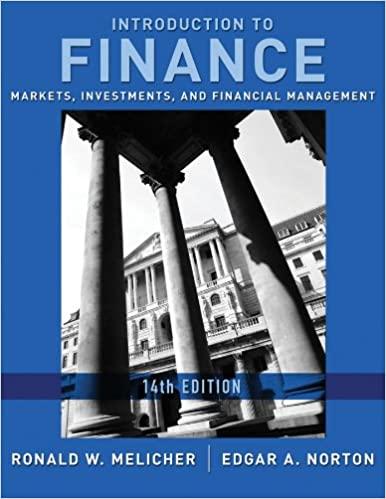Question
You are a financial planner who is investigating the options for a 45-year old man who wishes to have enough money to retire by the
You are a financial planner who is investigating the options for a 45-year old man who wishes to have enough money to retire by the time he is 65. The man has just turned 45 and has received a sizable inheritance of $250,000. He has approached you to understand his financial situation and make an informed decision regarding his investment options for his financial future. His current financial arrangements are as follows:
His salary has just been increased to $120,000 p.a., which is taxed at a rate of 30% before being paid to him. This is currently being paid on a monthly basis at the start of each month.
Any salary over $200,000 p.a. will be taxed at 40% (i.e. the first $200,000 p.a. of salary is taxed at 30%, the amount over $200,000 p.a. is taxed at 40% - tax is paid at a constant rate each month during each year assuming that the monthly salary is to be earned over the whole year).
He is paying off a mortgage on the property he lives in. The payments are currently $3,700 at the end of each month, which is enough to have the property paid off exactly in 7 years at the current interest rate of 3.1% p.a. effective.
Currently each month, $2,900 of his net salary is being used in expenses and any additional amount is being invested in a bank account earning 2.1% p.a. compounded monthly. These payments are being made on the same day the net salary is received.
The current bank account balance (before receiving the inheritance) can be assumed to be zero. He expects his expenses to increase by 0.2% each month.
He expects his salary to increase at a rate of 5% p.a. going forward. This increase is processed on a yearly basis, with the next increase to occur after 12 further salary payments at the recently increased rate.
Interest income in the bank account is taxed at a concessional rate of 15% immediately on the interest income earned each month.
He intends to live in his home when he is retired and live off the proceeds of his bank account in retirement.
Initially, the man wants to deposit the inheritance in his bank account.
a) Calculate the expected amount the man will have in his bank account at age 65 under the basis above. Assume all interest rates remain constant.
The first thing you notice about this mans financial affairs is that it would most likely be beneficial for him to pay off the mortgage as quickly as possible. This would involve using the inheritance immediately and making a lump sum contribution to the home loan, and then continuing the $3,700 per month repayments until the loan is paid off. Any additional amount of salary not used is credited to the bank account.
b) Calculate how much more the man will have at age 65 if he takes this approach.
Please solve a and part b then
Step by Step Solution
There are 3 Steps involved in it
Step: 1

Get Instant Access to Expert-Tailored Solutions
See step-by-step solutions with expert insights and AI powered tools for academic success
Step: 2

Step: 3

Ace Your Homework with AI
Get the answers you need in no time with our AI-driven, step-by-step assistance
Get Started


